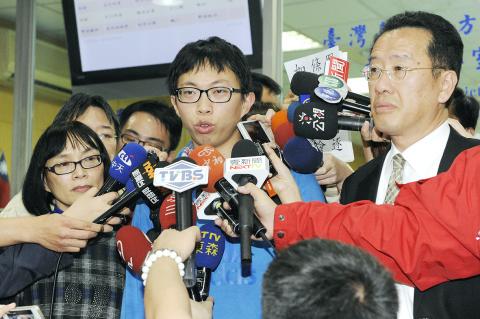The Taipei District Court yesterday released student activist Dennis Wei (魏揚) without bail, after prosecutors accused him of having led a protest that escalated into the storming of the Executive Yuan building in Taipei on Sunday night.
Wei, a graduate student at National Tsing Hua University’s Institute of Sociology, walked out of the courtroom at 12:20pm to the cheers of his family and supporters, before tearfully hugging his mother.
The Taipei District Prosecutors’ Office said Wei has been charged with violating Article 150 of the Criminal Code — inciting people in an open assembly to employ threats or violence — which could see him face between one and seven years in prison if found guilty.

Photo: Chen Chih-chu, Taipei Times
He was also charged with obstructing an officer in the performance of their duties; destruction, abandonment and damage of property; breaking and entering; and with violating the Cultural Heritage Preservation Act (文化資產保存法), among other counts, the office said.
According to the district court’s ruling, Wei posted a message on Facebook at 9pm on Sunday calling for students to join the occupation of the Executive Yuan — two hours after the siege had begun — which indicated that he did not play a leading role in inciting protesters to occupy the complex.
The ruling added that several students arrested and under investigation have said in their statements that Wei’s posting did not incite them to storm the Executive Yuan.
Video footage shows Wei speaking to protesters on a microphone during the siege, but the court ruled that his presence at the site does not prove that he broke into the complex and damaged property.
Wei said in a statement yesterday that he did not mastermind the occupation of the Executive Yuan.
“I arrived in Taipei from Hsinchu City by bus at about 8pm and was preparing to go back to the Legislative Yuan sit-in, but upon learning on Facebook that the Executive Yuan had been occupied by students, I decided to go to the Executive Yuan and arrived there after 8pm,” the statement said.
Wei said he asked the other students if he could him help lead the protest, while urging the protesters to remain calm and not break into any offices.
Turning to Premier Jiang Yi-huah’s (江宜樺) remarks that police only “carried protesters away or tapped them on the shoulder and asked them to leave,” Wei said he saw officers attack protesters with sticks and shields.
“Any bloodshed that took place during the violent eviction must be taken up with the officer in charge of the operation and with President Ma Ying-jeou (馬英九),” he added.

Chinese Nationalist Party (KMT) Chairman Eric Chu (朱立倫), spokeswoman Yang Chih-yu (楊智伃) and Legislator Hsieh Lung-chieh (謝龍介) would be summoned by police for questioning for leading an illegal assembly on Thursday evening last week, Minister of the Interior Liu Shyh-fang (劉世芳) said today. The three KMT officials led an assembly outside the Taipei City Prosecutors’ Office, a restricted area where public assembly is not allowed, protesting the questioning of several KMT staff and searches of KMT headquarters and offices in a recall petition forgery case. Chu, Yang and Hsieh are all suspected of contravening the Assembly and Parade Act (集會遊行法) by holding

PRAISE: Japanese visitor Takashi Kubota said the Taiwanese temple architecture images showcased in the AI Art Gallery were the most impressive displays he saw Taiwan does not have an official pavilion at the World Expo in Osaka, Japan, because of its diplomatic predicament, but the government-backed Tech World pavilion is drawing interest with its unique recreations of works by Taiwanese artists. The pavilion features an artificial intelligence (AI)-based art gallery showcasing works of famous Taiwanese artists from the Japanese colonial period using innovative technologies. Among its main simulated displays are Eastern gouache paintings by Chen Chin (陳進), Lin Yu-shan (林玉山) and Kuo Hsueh-hu (郭雪湖), who were the three young Taiwanese painters selected for the East Asian Painting exhibition in 1927. Gouache is a water-based

Taiwan would welcome the return of Honduras as a diplomatic ally if its next president decides to make such a move, Minister of Foreign Affairs Lin Chia-lung (林佳龍) said yesterday. “Of course, we would welcome Honduras if they want to restore diplomatic ties with Taiwan after their elections,” Lin said at a meeting of the legislature’s Foreign Affairs and National Defense Committee, when asked to comment on statements made by two of the three Honduran presidential candidates during the presidential campaign in the Central American country. Taiwan is paying close attention to the region as a whole in the wake of a

OFF-TARGET: More than 30,000 participants were expected to take part in the Games next month, but only 6,550 foreign and 19,400 Taiwanese athletes have registered Taipei city councilors yesterday blasted the organizers of next month’s World Masters Games over sudden timetable and venue changes, which they said have caused thousands of participants to back out of the international sporting event, among other organizational issues. They also cited visa delays and political interference by China as reasons many foreign athletes are requesting refunds for the event, to be held from May 17 to 30. Jointly organized by the Taipei and New Taipei City governments, the games have been rocked by numerous controversies since preparations began in 2020. Taipei City Councilor Lin Yen-feng (林延鳳) said yesterday that new measures by